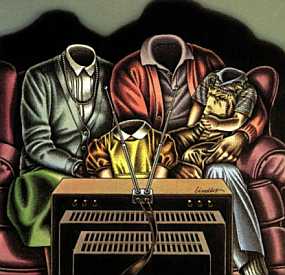The group in charge of giving their presentation about Myspace.com did an excellent job of bringing to light the underlying issues associated with the social networks rampant in our “Western World”. The group did not limit themselves solely to Myspace.com however, they also explored Facebook.com and Twitter. One of the prominent questions when discussing social networks is the question of why we are so driven to publicize every single aspect of our supposed private lives for all to see. Updating statuses and checking our pages has almost become a compulsive disorder that is slowly turning into an addiction. This leads one to wonder; how is this digitalization affecting how we interact with our fellow humanoids? The group showed an amusing clip posted on youtube.com that satirized this dilemma. The clip showed an individual interacting with another much as one would do online. His ridiculous behavior and blatant lack of any tact whatsoever served to demonstrate how technology can either transform us into tactless extortionist or offer us the necessary veiling express ourselves this way. The fact that someone can type in your name into a search engine and immediately have access to a great deal of information about you is eerie to say the least. Worst yet is the reality that even with your telephone number someone can find out information about you that you would never give out. Where you live, your age, your family members names and ages etc. Now with updates in social networks and “innovations” such as Twitter.com it is ever easier for others to know your exact location at any point in time. Why anyone would willingly put this kind of information online for all to see is beyond comprehension. As a peer mentioned in class, private detectives were once the “good old fashioned” way to find someone of interest. Nowadays however, I wouldn’t be investing in any private eye companies any time soon. I am sure this business has lost a great deal of customers because with our current technological explosion anyone with Internet access and enough determination can find your whereabouts relatively easily. The very thought is disturbing and unsettling to say the least. If Aldous Huxley and George Orwell could only know the extent of our technological dependence they would be beside themselves with angst and disbelief at our obvious ignorance of the totalitarian potential that lies within technology.



Neil Postman summarizes it best when he explores the writings of Huxley and Orwell and states:
“Huxley grasped as Orwell did not, that it is not necessary to conceal anything from a public insensitive to contradiction and narcoticized by technological diversions. Where people once sought information to manage the real contexts of their lives, now they had to invent contexts in which otherwise useless information might be put to some apparent use.” (Postman, 1986).
Whoa! If this is not a accurate depiction of our current status I do not know what is. As Postman
sagely observed, we are obsessed with creating contexts such as youtube, Twitter, Facebook
and Myspace on which we can post copious amounts of nonsensical and insignificant
“information” to share with the world at large. If you don’t believe me just look up how many
views the toilet-flushing cat has on youtube….

Postman, Neil. Amusing Ourselves to Death: Public Discourse in the Age of Show Business. New York: Penguin, 1986. Print










